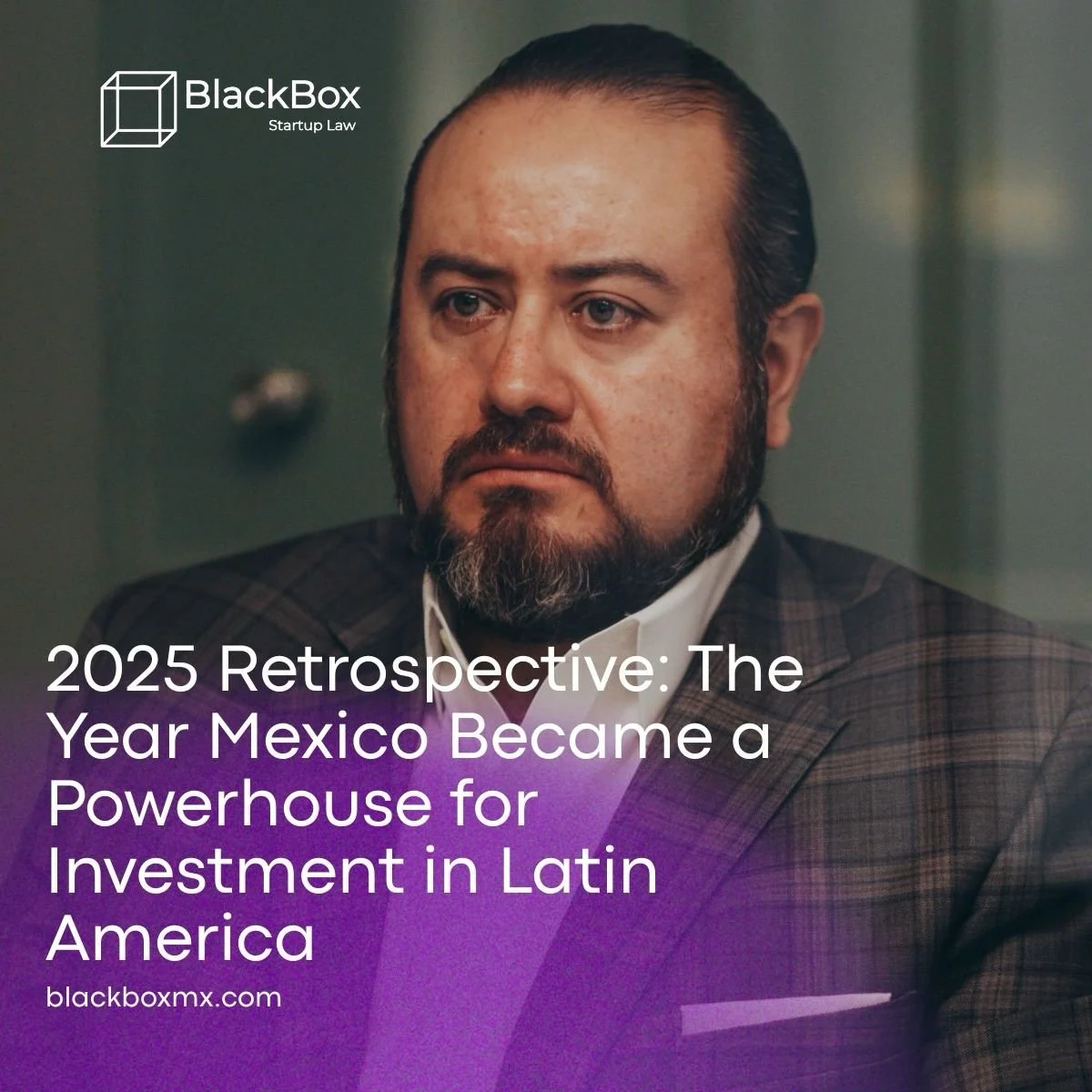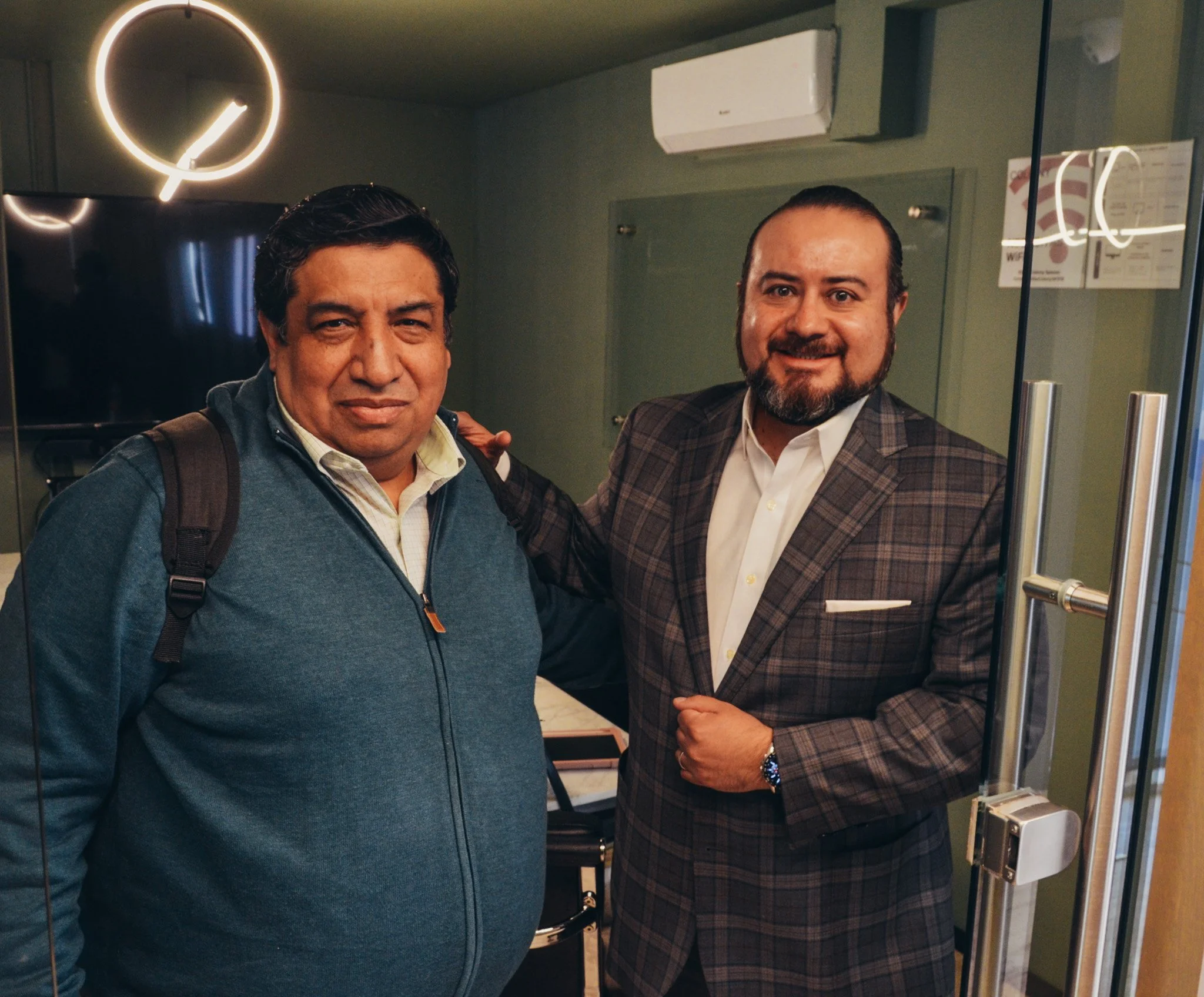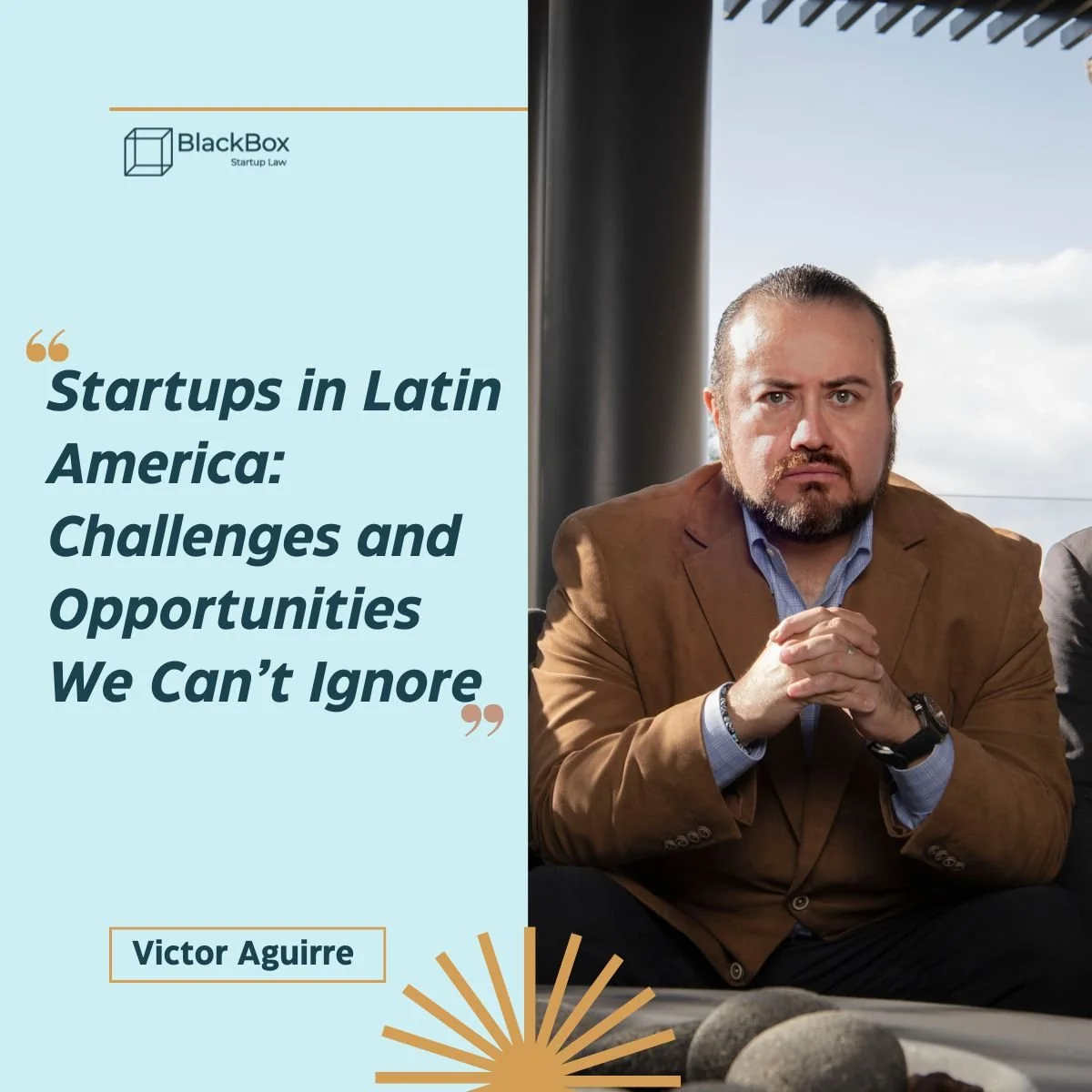📌Keep in mind these five strategic tips when raising money (even from family members):
Reach out to Victor Aguirre López and the team at BlackBoxLaw to ensure your startup is investor-ready.
Seed Round Survival Playbook: Terms That Build (or Kill) Startups.
Reach out to Victor Aguirre López and the team at BlackBoxLaw to ensure your startup is investor-ready.
2026: The Year of WhatsApp + AI Agents
If your pitch deck relies on acquiring users by forcing them to the App Store, you might be pitching to an empty room.
The reality is that VCs are losing interest in funding friction. Customer Acquisition Costs (CAC) are skyrocketing, and users are tired of cluttering their screens with single-use icons.
Nowhere is this truer than in Latin America.
In LatAm, WhatsApp is much more than just a messaging tool. From Mexico to Brazil, millions of users live their digital lives inside that green icon. They don't want to leave the chat to transact.
But here is the new hype: It’s not just about chat; it’s about automated intelligence.
Scaling a WhatsApp strategy used to mean hiring armies of support staff. Not anymore. The new winners are integrating AI Agents to automate the ecosystem 24/7.
Fintech: AI Agents underwriting micro-loans instantly via chat.
Recruiting: Automated assistants scouting and screening talent via voice notes.
Health: AI triage providing medical guidance before a human doctor steps in.
If you want to win in this region, stop building islands. Start building intelligent bridges into the chat window.
Is your product built for the AI-powered LatAm reality, or are you still banking on a download? Victor Aguirre López
2025 Retrospective: The Year Mexico Became a Powerhouse for Investment in Latin America
The year 2025 redefined the game for founders and cemented Mexico's position as a global investment player! 🚀 I took a deep dive into the core themes that dominated discussions and capital deployment:
1. The Founder's Mindset in 2025:
Generative AI & Autonomous Agents: It's no longer about merely adopting AI, but integrating autonomous agents that operate with zero friction across workflows. The key takeaway? Maximum Efficiency.
Vertical SaaS & Hyper-personalization: The search for highly niche software solutions (Vertical SaaS) and hyper-personalized offerings became the engine for sustainable growth.
The New Capital Discipline: With VC volatility, the emphasis shifted: Resilience, Discipline, and Runway (long-term financial capacity) were valued far more than speed at any cost.
2. Mexico: The New Investment Giant:
Mexico didn't just weather the storm—it thrived, becoming the new Venture Capital hub of Latin America and hitting historic records in Foreign Direct Investment (FDI).
✅ Nearshoring in Action: Proximity to the US boosted the relocation of manufacturing and services, bringing a massive influx of capital and new investments.
✅ Confidence and Growth: The country demonstrated economic resilience, solidifying the confidence of major international investors and VC funds.
✅ Tech & Talent: The Mexican startup ecosystem proved to be a talent powerhouse, especially in Fintech and Logistics, attracting the largest share of regional risk capital.
2025 was a year of learning: Efficiency, the right technology, and strategic location form the successful triad.
Which of these trends had the biggest impact on your business in 2025? Share your thoughts below! Victor Aguirre López
STOP! You Are NOT Incorporated (Yet). The 12-Slide Legal Checklist to Protect Your Personal Assets
The choice of legal entity is crucial to defining your liability, taxes, and financing capability. Before taking the next step, check out this summary of our legal checklist!
Main Entity Types:
Sole Proprietorship: The maximum risk option. The owner has unlimited liability for losses, putting all personal assets at risk.
C Corporation: The gold standard for Venture Capital (VC). It is preferred because VCs use tax-exempt funds that cannot invest in flow-through entities (LLC/Partnership). Key advantages include limited liability and unlimited life. It is superior for employee incentives , as it allows cheaper pricing for founder/employee stock and is the only entity that can offer Incentive Stock Options (ISOs), which provide tax-favored treatment to the employee.
S Corporation: Offers flow-through taxation (tax generally paid only by the shareholder). Restrictions include a maximum of 100 shareholders and only one class of stock.
LLC (Limited Liability Company): Combines limited liability with flow-through taxation. It is the entity of choice for using initial losses for corporate investors and does not have the shareholder restrictions of the S Corp (can have corporations and partnerships as members).
Maintaining Limited Liability:
To prevent "Piercing the Corporate Veil," you must separate corporate and personal funds and document all board/shareholder actions.
Essential resource shared by Victor Aguirre López , Carlos Aguerrebere Álvarez, and Iván Guzmán Morales. 🚀 What other factors did you consider when choosing your business's legal structure?
11 Questions Every Founder Needs to Answer Before Incorporating.
11 Questions Every Founder Needs to Answer Before Incorporating.
At BlackBox we are sharing a deck that answers the essential questions about startup incorporation.
Incorporation isn't just about paperwork—it's about setting the foundation for scalability.
Key takeaways:
• Why Incorporate? It’s not just liability protection; it’s about properly issuing equity with vesting schedules and centralizing IP ownership.
• The "Double Taxation" Myth: Don't let this fear drive your decision. For early-stage startups, this is rarely an issue because they rarely pay dividends.
• The Fatal Error: Failing to update your Registered Agent information can actually lead to the forfeiture of your company.
If you have questions contact Victor Aguirre López, Carlos Aguerrebere Álvarez, Iván Guzmán Morales .
#StartupLaw #Founders #Incorporation #VentureCapital #Entrepreneurship
BlackBox announces expert partnership to strengthen compliance, regulation, and financial structuring in Mexico.
Ariel A. Lupa Mendlovic, Iván Guzmán Morales, Carlos Aguerrebere Álvarez and Victor Aguirre López celebrate a new strategic alliance to strengthen legal, tax, and regulatory advisory services for entities in the Mexican financial sector. 🇲🇽⚖️💳
This collaboration has a clear objective: to support banks, fintechs, SOFOMES, funds, and other players in the financial ecosystem in an increasingly complex environment in matters of:
Financial regulation and relations with authorities (CNBV, CONDUSEF, Banxico, UIF)
Regulatory compliance and AML
Structuring of credit products and digital financial services
Corporate governance and support for committees and boards of directors
As Ariel—who served as General Counsel at Covalto, a Mexican bank focused on the SME segment—states:
“Now more than ever, financial institutions need advisors who understand both regulation and day-to-day operations. This alliance allows us to stay close to the teams, help them make better decisions, and anticipate risks.”
For his part, Iván Guzmán, founder of BlackBox, adds:
“Our focus is clear: to combine legal, tax, and financial experience to offer comprehensive solutions to the financial sector. We want to be the strategic partner for banks, fintechs, and credit vehicles that are building the future of financial services in Mexico.”
We will soon be sharing more details, content, and use cases.
If you lead or invest in a financial institution or fintech in Mexico and would like to review your structure, compliance, or new products, we’d be happy to talk.
BlackBoxLaw Sets Its Sights High: Strategic Presence at Talent Land Latin America 2026
Victor Aguirre López met with Angel Blanco to discuss the role of BlackBoxLaw in Talent-Network Talent Land 2026, which will be held for the first time in Mexico City, solidifying the event as the largest gathering point for talent, technology, and business in the region.
The 2026 edition promises to take the experience to a new level:
ºFrom April 9 to 11, 2026, at Centro Banamex
ºAn expected attendance of more than 30,000 participants
ºAreas dedicated to AI, startups, business, development, creativity, health, gaming, investments, and much more
Bankruptcy in Mexico Is Very Expensive — Here’s Why
💸 Bankruptcy in Mexico.
In Mexico, entering a Concurso Mercantil (bankruptcy & restructuring process) under the Ley de Concursos Mercantiles (“Bankruptcy Act”) is not just a legal strategy — it’s a financially complex, resource-intensive, and highly procedural journey that can become extremely expensive if a company is not fully prepared.
Unlike other jurisdictions like the US or UK focused on fast-track restructuring, Mexico’s Bankruptcy Act requires a deep evidentiary burden, formal corporate approvals, auditable financial disclosure, and document-perfect filings with the Federal Institute of Specialists in Commercial Insolvency Proceedings (Instituto Federal de Especialistas en Concursos Mercantiles; “IFECOM”).
At BlackBox Startup Law, we regularly advise companies, founders, investors and boards on how to strategically manage financial distress before reaching irreversible legal consequences.
A quick look at the required documentation shows how administratively heavy the process is, involving:
✔ Financial statements for 3+ years, preferably audited
✔ Legal proof of merchant/commercial status
✔ Inventory of assets & liabilities
✔ Evidence of default with at least two creditors
✔ Full list of creditors, debtors & lawsuits
✔ Corporate resolutions and powers of attorney
✔ Preliminary repayment & business continuity plan
Why is it so expensive?
1️⃣ High legal + financial advisory fees (corporate, litigation, labor, tax, restructuring)
2️⃣ Volume and complexity of required evidence
3️⃣ Procedural duration — cases can easily extend months or years
4️⃣ Costs of court-appointed specialists (conciliador, síndico, etc.)
5️⃣ Business interruption costs
In many cases, companies discover that bankruptcy is not only a last resort, but also a costly one — especially if no prior restructuring, preventive negotiation, or operational optimization was attempted.
A strategic recommendation
If your business is showing signs of insolvency:
Seek preventive restructuring first (out-of-court workouts).
Review bridge financing, sale & leaseback financing, or asset-light renegotiation models.
Consider M&A distress deals before formal court filing.
Maintain clean and updated corporate and financial documentation.
Act early, because late legal help is the most expensive version.
Victor Aguirre, founder of BlackBox Startup Law, emphasizes that "startups facing insolvency often benefit more from creative, rapid, out-of-court solutions tailored to their specific cap table and growth trajectory, rather than the costly rigidity of a formal Mexican Bankruptcy Procedure (Concurso Mercantil)."
For more information visit www.blackboxmx.com
Learn more about Mexico's Startup and VC ecosystem.
🇲🇽 Mexico is living a defining moment.
Over the past few years, the country has emerged as one of Latin America’s most dynamic hubs for innovation and investment, drawing the attention of founders, venture capital funds, and global corporations alike.
There are strong fundamentals behind this shift:
✅ A diversified, open economy integrated with U.S. and North American supply chains.
✅ A fast-growing base of technical talent: engineers, developers, and digital professionals.
✅ A maturing startup ecosystem, led by Mexico City, Guadalajara, and Monterrey.
📍 And, most importantly, a strategic geographic position connecting North and South America, making Mexico the ideal launchpad for regional expansion.
At BlackBox Startup Law, we see this transformation every day.
We partner with founders and funds building the next generation of companies across Mexico and Latin America — helping them structure cross-border operations, navigate complex regulations, and ensure long-term governance and compliance.
🗣️ Our Partners’ Perspectives
Victor Aguirre, Partner:
“Mexico is no longer just a market to enter, it’s a region to build from. Many founders are designing cross-border strategies from day one.”
Carlos Aguerrebere, Partner:
“We’re seeing venture investors approach Mexico with institutional discipline.”
Iván Guzmán, Partner:
“Strong compliance and local execution are what turn ambition into sustainable expansion. That’s where legal precision truly creates value.”
The future of innovation is multi-regional, and Mexico stands at the heart of that convergence — where capital, talent, and opportunity meet.
💡 Investing in Mexico is investing in the future of Latin America.
#BlackBoxStartupLaw #VentureCapital #Innovation #Mexico #LATAMStartups #CrossBorder #LegalStrategy #Founders #InvestInMexico #Governance #Compliance
PROTECTING CREATIVE OWNERSHIP IN THE AGE OF GENERATIVE AI
Table of Contents: I. Abstract. II. Introduction. III. Terms and Conditions Analysis IV. Recommended Guidelines V. Conclusion.
I. Abstract
In the lasts years, Large Language Models (LLMs) have been employed massively in creative areas, supporting founders in the creation of new products, software and services. The main purpose of this paper is to have an understanding of the risks involved in using generative AI in the development of strategic intellectual property in order to use LLMs in a responsible way. To achieve this paper analyses the terms and conditions of ChatGPT, DeepSeek and Mistral in their free versions. The results of this analysis suggest that not understanding the terms and conditions, using the LLMs in their free versions (without opt-out options integrated) and not documenting Inputs that involve registrable information can lead to irremediable future damages to the value of founders’ IP. Overall, this study contributes to protecting the founders’ IP by providing some guidelines that can be followed by organizations to mitigate future legal actions and loss of Intellectual property (IP) rights by the use of generative AI.
II. Introduction
With the rise of Artificial Intelligence (AI), the use of Large Language Models (LLMs) has become massively adopted by entrepreneurs and content creators for creating their logos, marketing campaigns, and— more importantly—for developing their products. While LLMs have brought innovation, lower costs, and an increase in productivity for their users, they have also blurred the boundaries between human and machine-generated work. The following analysis looks at the risks that exist for startup founders and developers in using LLMs for the creation of software, products, and overall, their proprietary information. In order to start this analysis, it must be clarified that this information is only relevant to free accounts in ChatGPT, DeepSeek, and Mistral. It is also especially important to distinguish between Inputs and Outputs in these tools. The former are the so-called prompts users enter into the LLMs, while the latter refers to the result generated by the LLM. Since this distinction has been clarified, three different points can be analyzed: first, the lack of protective laws and terms and conditions applicable for LLMs; second, the risks of disclosing Intellectual Property (IP) in the Inputs; and third, the risks of using the Outputs generated by the AI System. Lastly, guidelines for the correct use of LLMs will be recommended.
III. Terms And Conditions Analysis
As previously mentioned, firstly, in Mexico and in the United States, there are no specific laws that protect users of LLMs regarding the ownership of their Inputs and Outputs. As a result, users of these tools need to understand the terms and conditions of each provider in order to mitigate risks by identifying how they manage IP, data, and Outputs. It is essential to understand the terms and conditions of the LLMs to mitigate legal consequences as will be outlined in the following situations.
Secondly, it is important to know what happens to the Inputs in LLMs. Depending on the company owning the LLM, there are different terms and conditions that may arise and it is crucial to understand their key differences in order to protect the founders’ content. Depending on the LLM, some are automatically granted a perpetual license for every Input their users share on their platform. This means that there are various risks from sharing any key information. If the IP information was not legally registered before introducing it as an Input into the LLM, then it can be difficult to register it later on, because then that information will have become public and the LLM can share it to any other of its users in the future without having to pay any damages for the reproduction of those Inputs.
Thirdly, in relation to the results produced by LLMs, Outputs do not get any IP protection because the law only protects IP created by humans. This means that content produced entirely by AI tools is not entitled to authorship rights, preventing the companies using this content from registering and protecting it. Not only that, but using LLM’s outputs can also be risky and can have legal consequences because the Outputs can infringe the IP of third parties.
Specifically, ChatGPT establishes in their terms and conditions (TCs) that users are—at all moments—owners of their Inputs and Outputs (Content), but states that it can use said Content for developing, maintaining, and improving their services. In other words, if TCs are accepted, ChatGPT is granted the right to use users’ data for almost all general purposes. In a similar fashion, DeepSeek’s TCs do not bestow ownership of the Content, but it has the right to use it to operate, develop, or improve their services. Lastly, Mistral asks for a perpetual license to maintain and optimize Mistral’s AI Products. As explained in the introduction, this applies to free accounts, while in all three cases, having a business premium account gives its users the right to opt-out their data from the AI data training system.
Furthermore, if the LLM is allowed to employ users’ Content at any time, this can create potential risks in the case that it discloses confidential information and reproduces similar or identical data to other users’. Subsequently, the use of these LLMs can potentially damage third parties when creating data that infringes copyright, but these LLM companies impose liability limitations in their TCs to their users. For instance, in the event a claim or legal action arises in the use of AI-generated content, OpenAI and DeepSeek establish that, as permitted by the law, they will not indemnify their users in any way. In the case of Mistral, contrary to the other LLMs, it will indemnify for any damages stemming from any third-party claim asserting that the Mistral AI Products breach or misappropriate any intellectual property right of a third party.
IV. Recommended Guidelines
As a result of the legal vulnerabilities related to the use of LLMs, it is important to follow some guidelines while using them in order to not get behind competitors in terms of productivity and innovation, and at the same time, prevent future lawsuits and the impossibility of registering IP or giving perpetual licenses to AI companies in order to use vital information. Following are some guidelines:
1. Explain the risks of Input to all employees and, if possible, buy LLM’s licenses that prevent them from using the Input in their data-training system.
2. Verify licenses and terms and conditions before using any LLM.
3. Implement traceability measures in order to have proof of the way the Outcomes were created and to be able to justify to what extent the IP was created with human intervention.
4. Ensure that employees are using the LLM provided by the company, which protects the startup’s IP.
V. Conclusion
LLMs offer a great advantage in terms of getting new solutions and content and can be a great tool in almost any business. However, the indiscriminate use of these systems without any preventive measures in place can be problematic, making their users liable to IP lawsuits and not able to protect their IP if it was developed with the help of AI. To reiterate, these issues affect users of free accounts. In general, premium accounts have more protections for their users, but a review of terms and conditions is always advisable. Following the guidelines shared can help mitigate these risks, especially for developers and content creators. Protecting IP in this new environment needs to be seen as a vital part in the process of creating new products and services. Understanding and using preventive measures leads to standing out from the competition by being able to attract more investments for your startup. More importantly, being able to guarantee that your intellectual property remains yours and can be registered by you in the future will prove to be invaluable.
VI. References
1.DeepSeek. DeepSeek Terms of Use. [Online].; 2025 [cited 2025 11 08. Available from:
https://cdn.deepseek.com/policies/en-US/deepseek-terms-of-use.html.
2.MistralAI. Legal terms and conditions. [Online].; 2025 [cited 2025 11 08. Available from:
https://mistral.ai/terms#terms-of-service.
3.OpenAI. Terms of Use. [Online].; 2024 [cited 2025 11 08. Available from:
https://openai.com/policies/row-terms-of-use/.
x
Mexico strengthens its position as one of Latin America´s leading startup ecosystems in 2025
Victor Aguirre - Founder BlackBox
According to TTR Data, the total value of venture capital transactions in Mexico grew by 65.8% in the first quarter of 2025 compared to the same period in 2024 — increasing from approximately US$163 million to US$271 million.
In the second quarter, Mexico also surpassed Brazil in total startup investment volume, with US$437 million raised by Mexican companies versus US$350 million by Brazilian startups, according to MexCham.
This growth reflects the maturity and international appeal of Mexico’s innovation ecosystem, which continues to attract attention from global funds such as:
500 Global (formerly 500 Startups), a reference in early-stage investments across Latin America;
Kaszek Ventures, one of the region’s largest funds, actively investing in fintech and healthtech startups;
Mouro Capital, a global fintech-focused fund originated by the Santander Group;
IDC Ventures, expanding its presence in Mexico through growth-stage investments.
These movements reinforce Mexico’s position as a strategic hub for venture capital and entrepreneurship in Latin America, with strong growth prospects for the coming years.
hashtag#VentureCapital hashtag#Startups hashtag#Mexico hashtag#Innovation hashtag#Investment hashtag#Entrepreneurship hashtag#LatAm hashtag#StartupEcosystem hashtag#Fintech hashtag#LatAmVC hashtag#Kaszek hashtag#500Global hashtag#MouroCapital hashtag#IDCventures
Legal Alert: Major Reforms to Mexico´s Amparo Law
Carlos Aguerrebere - Founder BLACKBOX
The decree modifying the Amparo Law, the Federal Tax Code, and the Organic Law of the Federal Court of Administrative Justice has been published. These changes, already in effect, will directly impact litigation and interim measures.
What you need to know:
1. Digitalization & Communications
• The Electronic Signature (Firma Electrónica) is now the official means of access to the Judiciary's electronic system.
• All authorities involved in an amparo proceeding must create a user on the Online Services Portal.
• Notifications to authorities will be primarily electronic.
2. Limitation of Access to Amparo via Legitimate Interest
• To access amparo proceedings by claiming "legitimate interest," it's now necessary to prove a real and differentiated individual or collective legal injury. This may lead judges to dismiss more claims without an in-depth analysis.
3.Restrictions on the Suspension of the Challenged Act
• Key Point: In amparo proceedings challenging general norms, the suspension will NEVER be granted with general effects.
• Suspension will require a balanced analysis of the prima facie case (apparent good right) and social interest.
• In tax matters, the suspension of the collection of final tax credits will be discretionary and will require a guarantee.
4.Other Key Changes
• Appeals under the Federal Tax Code against acts requiring the payment of final tax credits are now inadmissible.
• The Federal Court of Administrative Justice (TFJA) will no longer have jurisdiction over these cases.
Bottom Line: These reforms aim to streamline the system and limit the use of the amparo for dilatory purposes, particularly in tax matters. It is essential for lawyers, accountants, and managers to review their legal strategies.
hashtag#LegalReform hashtag#AmparoLaw hashtag#Mexico hashtag#TaxLaw hashtag#MexicanLaw hashtag#BusinessInMexico hashtag#LegalUpdate hashtag#TFJA
LEGAL ALERT: Mexico's New AI Law at a Crossroads: Risk-Based Regulation vs. Innovation.
Victor Aguirre - Founder BLACKBOX
Frank founder, Charlie Javice, was convicted in March 2025 for orchestrating a massive fraud during JPMorgan Chase's acquisition of her startup. The basis of the fraud was the manipulation of essential valuation metrics:
The Deception of the Numbers: Javice claimed to have over 4.25 million users on her student aid platform. The reality, proven in court, was approximately 300,000 real customers. A difference of more than 93% achieved by hiring a data scientist to create 4.2 million synthetic profiles.
Where Did JPM's Due Diligence Fail?
Gigantic institutions like JPM are also vulnerable when it comes to digital assets. Investigations revealed critical process failures:
Speed Over Substance: Pressure to close the deal quickly (partially due to fear of competition) led the M&A team to sacrifice the depth of forensic analysis.
Insufficient Verification: Instead of demanding direct, supervised access to the core database, JPM accepted a third-party company to count data fields. The fake, but well-formatted, data passed this superficial test.
Ignored Red Flag: Javice initially denied access to the real data, citing concerns about user privacy and terms of service. This is a fundamental red flag that should have halted the DD process.
The New Standard for FinTech Due Diligence: Zero Data Risk
The Frank case proves that trust in the founder (Javice was a Forbes 30 Under 30) must be replaced by uncompromising technical verification.
To protect capital and reputation in FinTech M&A, the new DD protocol must be:
Direct Access to the Source (DADA): Demand secure, supervised access to the core database to audit the authenticity and provenance of the data, not accepting third-party verifications.
Forensic Pattern Analysis: The DD team must include data science experts to analyze timestamps, IP distribution, and, crucially, engagement rates to detect statistical anomalies typical of synthetic data.
Engagement-Based Earn-Out: Structure the acquisition payment based on post-acquisition performance metrics (like customer retention and LTV), rather than solely on pre-acquisition user volume.
The lesson is clear: in the digital economy, transparency is not a courtesy; it is a mandate. Rigorous Due Diligence is the only effective insurance against corporate fraud.
hashtag#DueDiligence hashtag#FinTech hashtag#MA hashtag#CorporateFraud hashtag#CharlieJavice hashtag#JPMorgan hashtag#Risk
The Charlie Javice Fraud and the Critical Importance of due Diligence
Frank founder, Charlie Javice, was convicted in March 2025 for orchestrating a massive fraud during JPMorgan Chase's acquisition of her startup. The basis of the fraud was the manipulation of essential valuation metrics:
The Deception of the Numbers: Javice claimed to have over 4.25 million users on her student aid platform. The reality, proven in court, was approximately 300,000 real customers. A difference of more than 93% achieved by hiring a data scientist to create 4.2 million synthetic profiles.
Where Did JPM's Due Diligence Fail?
Gigantic institutions like JPM are also vulnerable when it comes to digital assets. Investigations revealed critical process failures:
Speed Over Substance: Pressure to close the deal quickly (partially due to fear of competition) led the M&A team to sacrifice the depth of forensic analysis.
Insufficient Verification: Instead of demanding direct, supervised access to the core database, JPM accepted a third-party company to count data fields. The fake, but well-formatted, data passed this superficial test.
Ignored Red Flag: Javice initially denied access to the real data, citing concerns about user privacy and terms of service. This is a fundamental red flag that should have halted the DD process.
The New Standard for FinTech Due Diligence: Zero Data Risk
The Frank case proves that trust in the founder (Javice was a Forbes 30 Under 30) must be replaced by uncompromising technical verification.
To protect capital and reputation in FinTech M&A, the new DD protocol must be:
Direct Access to the Source (DADA): Demand secure, supervised access to the core database to audit the authenticity and provenance of the data, not accepting third-party verifications.
Forensic Pattern Analysis: The DD team must include data science experts to analyze timestamps, IP distribution, and, crucially, engagement rates to detect statistical anomalies typical of synthetic data.
Engagement-Based Earn-Out: Structure the acquisition payment based on post-acquisition performance metrics (like customer retention and LTV), rather than solely on pre-acquisition user volume.
The lesson is clear: in the digital economy, transparency is not a courtesy; it is a mandate. Rigorous Due Diligence is the only effective insurance against corporate fraud.
Victor Aguirre - Founder
hashtag#DueDiligence hashtag#FinTech hashtag#MA hashtag#CorporateFraud hashtag#CharlieJavice hashtag#JPMorgan hashtag#Risk
The Capital Focus Has Shifted — 2024–2025
Over the past two years, Latin America has proven that resilience and profitability can coexist with innovation.
The region’s venture landscape evolved from rebound to maturity — where discipline, selectivity, and sustainable growth define the new investment paradigm.
- Above-Average Growth (2024–2025):
Capital raised in LATAM grew 26% in 2024 and maintained strong double-digit growth in 2025, surpassing Europe and diverging from slowdowns in North America and Asia. Investors are doubling down on the region’s fundamentals — large markets, digital adoption, and operational efficiency.
- Late-Stage Priority:
Across both years, over 60% of total capital was allocated to Growth and Late-Stage rounds.
The focus has shifted toward proven business models with clear profitability paths, emphasizing companies with financial discipline and scalable infrastructure.
Case Studies: Profitable Unicorns and Benchmark Exits (2024–2025)
(i) QI Tech (Infrastructure Unicorn):
QI Tech continues to validate LATAM’s new mandate — profitability since Year 1 and a strong regulatory moat (SCD/DTVM). Capital increasingly flows to B2B fintechs building the embedded finance backbone of the region.
(ii) RD Station (The SaaS Benchmark):
The ≈ USD 370 million acquisition by TOTVS remains a reference point for SaaS valuations.
M&A activity accelerated through 2025, driven by corporate buyers seeking profitable digital assets and regional expansion.
(iii) NotCo (AI + FoodTech Efficiency):
By blending artificial intelligence with sustainable food innovation, NotCo reached profitability in core markets and expanded global partnerships (including Kraft Heinz).
It exemplifies LATAM’s ability to compete globally through tech-enabled efficiency and product innovation.
(iv) EBANX (Cross-Border Payments):
EBANX consolidated its position as LATAM’s gateway for global merchants, combining disciplined growth with a robust regional regulatory edge.
Its evolution underscores the long-term value of compliance-based scalability in fintech.
(v) Emerging Frontiers (2025):
New capital waves are targeting Energytech, AI Infrastructure, and Deeptech — verticals that align LATAM’s innovation cycle with global priorities such as sustainability and automation.
Strategic Conclusion
The era of “growth at all costs” is over.
Between 2024 and 2025, capital in LATAM became more selective, more strategic, and more performance-oriented.
The winners are founders who build financially solid, tech-driven, and sustainably scalable companies — and investors who see beyond hype to long-term impact.
Carlos Aguerrebere - Founder
There comes a time when You can't do it all!
Hiring C-Level executives (CTO, CFO, COO, etc.) is the turning point for a Startup's scale. But be careful: hiring the wrong C-Level can be fatal. In a fast-paced environment, the criteria are different from a large corporation. You don't just need experience; you need an Entrepreneurial DNA. What truly matters in a Startup C-Level hire: "Hands-On" Mindset & Resilience: In Startups, there are no large support teams. The leader must be a strategist who is willing to get their hands dirty daily and can handle uncertainty. Total Cultural Alignment: They will be the architects of your culture. Misalignment at the top can undermine the morale and cohesion of the entire team. Cultural fit is non-negotiable. Focus on High-Impact Results: Define 3 to 5 critical goals they must deliver in the first 12 months. The focus isn't on the job title; it's on the impact they will generate for the next growth phase. Insider Tip: Don't hire for a title, hire for a PROBLEM! What is your most urgent pain point? If it’s fundraising and financial health: CFO. If it’s product scalability and infrastructure: CTO. If it’s professionalizing processes and operations: COO.C-Level hiring is an investment decision in your future. Align vision, culture, and compensation (with significant equity!) and prepare for takeoff!-Which C-Level hire does your Startup need most right now to unlock growth? Share your thoughts below!#Startup #Leadership #CLevel #Recruitment #Entrepreneurship #CSuite
Iván Guzmán - PARTNER
BlackBox Startup Law advises Clivi on JICA’s strategic investment
Victor Aguirre: We are proud to have supported Clivi in such a landmark transaction. This investment by JICA not only validates Clivi’s innovative approach to digital health, but also reinforces Mexico’s potential as a hub for global impact ventures.
We are proud to share that Blackbox was the company responsible for facilitating the partnership between the Japan International Cooperation Agency (JICA) and the Mexican startup Clivi – a historic investment agreement that strengthens digital health in Mexico. In just four years, Clivi has already transformed the lives of more than 10,000 patients with a 100% digital model that combines cutting-edge technology, medical science, and professional support to address critical challenges such as diabetes, obesity, and overweight. With more than US$100 billion in assets under management, JICA chose Clivi for its first direct investment in Mexico – reinforcing its global commitment to expand access to healthcare and accelerate the United Nations’ Sustainable Development Goals (SDGs). The outcome of this alliance Expanded access to digital healthcare in Mexico. Greater innovation in the fight against chronic diseases. A significant step toward a future with better quality of life. At Blackbox, we believe in the power of building strategic bridges between companies, investors, and markets. Our purpose is to create the pathways that make stories like this possible. The future is about impact, and Blackbox is part of this transformation.
Victor Aguirre - Founder
https://www.jica.go.jp/english/information/press/2025/20250716_12.html
#Blackbox #Innovation #ImpactInvestment #DigitalHealth #JICA #Clivi #SDGs
Funding Opportunities for Latino Founders
Victor Aguirre - Founder
One of the biggest challenges for Latin American entrepreneurs is still access to capital. In this context, initiatives like Angeles Investors are becoming increasingly relevant.
Their mission is clear:
•Find, fund, and grow the most promising Latino-founded startups.
This movement is not just about investment, but about representation and impact.
•More capital means more innovation.
•More innovation means more opportunities for the global Latino community.
The message is simple: the talent already exists. What we need are strong bridges between founders and investors to transform ideas into businesses that change reality. BlackBox Startup Law
Startups in Latin America: Challenges and opportunities we cant`t ignore
Victor Aguirre.
The innovation ecosystem in Latin America is at a decisive moment.
Despite macroeconomic fluctuations, there are still unique opportunities for founders who truly understand the local context.
•Marketplaces: According to funds like Magma Partners, there is still room for solutions that address structural inefficiencies in traditional sectors. The fragmentation of markets such as logistics, healthcare, and education opens the door for platforms that can connect supply and demand more efficiently.
•SaaS: Unlike the U.S. or Europe, in Latin America SaaS must be more than just “efficient software.” Here, management solutions need to adapt to local realities such as bureaucracy, lack of regulatory standardization, and even low digital penetration in certain sectors.
But along with these challenges comes a blue ocean of possibilities:
- Accelerated digitalization of small and medium-sized businesses
- Growing financial inclusion and new payment methods
- Young talent increasingly connected to global hubs
For founders in the region, the key is not to “copy Silicon Valley models” but to adapt global frameworks to the complexity of Latin America.
Blackbox Startup Law
























































